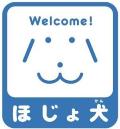Last updated: January 10, 2020
Assistance dogs for the physically disabled are guide dogs, service dogs, and hearing dogs that help people with visual, hearing, and limb disabilities in their daily lives.
This dog is certified under the Act on Assistance Dogs for Persons with Physical Disabilities and has undergone special training. They are companions for people with disabilities, not pets.

Assistance dog mark
The "Assistance Dogs for Persons with Physical Disabilities Act" requires that assistance dogs be accepted in various places where people can enter. Please do not refuse to accept assistance dogs just because they are dogs.
In addition to facilities managed by the national and local governments, public transportation such as trains and buses cannot refuse the use of assistance dogs.
Commercial facilities, restaurants, hospitals, hotels, and other private facilities that are used by an unspecified number of people cannot be refused access to people accompanied by "assistance dogs."
Displaying assistance dog stickers and educational posters at facility entrances and exits is an effective way to help facility users and customers understand assistance dogs.
The Tokyo Metropolitan Government provides assistance dogs (guide dogs, service dogs, hearing dogs) to people with physical disabilities, and by expanding their range of action, promotes the independence and social participation of people with physical disabilities. .
・Persons with physical disabilities living in Tokyo who are 18 years of age or older and living at home Guide dogs: Level 1 visual impairment Service dogs: Level 1 or 2 physical disabilities Hearing dogs: Level 2 hearing impairments Those with the following conditions: If any of the following apply: (1) You must have lived in Tokyo for approximately one year or more.
(2) The average monthly income tax amount for the entire household is less than 77,000 yen.
(3) Approval must be obtained from the owner or manager of the house where the applicant resides.
(4) Must be able to properly manage a service dog after receiving the required training.
(5) Being recognized as having an effect on participation in social activities.
Free (breeding costs, etc. must be paid by the individual)
Applications should be made to the city's Disability Welfare Division.
Forms are available at the counter.
The application period is determined for the first and second semesters of each fiscal year, so if you are considering receiving benefits, please consult the Disability Welfare Division.
Assistance dog users who come to Japan from overseas with their assistance dogs are not subject to the Act on Assistance Dogs for Persons with Physical Disabilities, but if they are recognized to be equivalent to Japanese standards, they will be allowed to use their assistance dogs during their stay in Japan. A "limited time certificate" will be issued by the assistance dog certification organization in Japan. As with Japanese assistance dogs, please do not refuse to allow users with certificates to accompany them to facilities, etc.
Inagi City Welfare Department Disability Welfare Division Phone: 042-378-2111